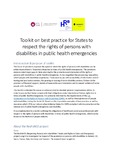| dc.contributor.author | Flynn, Eilionóir | |
| dc.contributor.author | Doyle Guilloud, Suzanne | |
| dc.contributor.author | Parker, April | |
| dc.date.accessioned | 2023-05-16T11:14:16Z | |
| dc.date.available | 2023-05-16T11:14:16Z | |
| dc.date.issued | 2023 | |
| dc.identifier.citation | Flynn, Eilionóir, Doyle Guilloud, Suzanne, & Parker, April. (2023). Toolkit on best practice for states to respect the rights of persons with disabilities in public health emergencies. Galway: Centre for Disability Law And Policy, University of Galway. https://doi.org/10.13025/q7cc-cg39 | en_IE |
| dc.identifier.uri | http://hdl.handle.net/10379/17773 | |
| dc.description.abstract | Introduction & purpose of toolkit.
The Covid-19 pandemic exposed the speed at which the rights of persons with disabilities can be either deprioritised or forgotten altogether in times of public health emergencies. The pandemic demonstrated major gaps in State planning for the protection and vindication of the rights of persons with disabilities in public health emergencies. It also magnified the pre-existing inequalities which people with disabilities experience. There were issues with accessibility of information and of testing and vaccination centres, the pausing or ceasing of some disability services, failures in the provision of financial support, denials of reasonable accommodation and increased isolation of some people with disabilities.
This toolkit is intended for use as an advocacy tool by disabled persons’ organisations (DPOs) in order to ensure that States comply with their obligations under international human rights law in times of public health emergencies. It is primarily informed by the requirements of the UN Convention on the Rights of Persons with Disabilities (CRPD), as well as the experiences of people with disabilities during the Covid-19. Based on this, it provides examples of best practice, as well as resources which DPOs can rely on when lobbying States for CRPD-compliant reform and action at the intersection of public health emergencies and disability.
It is complemented by a toolkit outlining the obligations of health and social care professionals with respect to the rights of persons with disabilities in times of public health emergencies, which can be found on the ResPoNCE project website. | en_IE |
| dc.format | application/pdf | en_IE |
| dc.language.iso | en | en_IE |
| dc.publisher | Centre For Disability Law And Policy, University of Galway | en_IE |
| dc.relation.ispartof | | en |
| dc.rights | CC BY-NC-ND 3.0 IE | |
| dc.rights.uri | https://creativecommons.org/licenses/by-nc-nd/3.0/ie/ | |
| dc.subject | persons with disabilities | en_IE |
| dc.subject | public health emergencies | en_IE |
| dc.subject | Disability Law | en_IE |
| dc.title | Toolkit on best practice for states to respect the rights of persons with disabilities in public health emergencies | en_IE |
| dc.type | Article | en_IE |
| dc.date.updated | 2023-05-12T07:21:24Z | |
| dc.identifier.doi | 10.13025/q7cc-cg39 | |
| dc.local.publishedsource | https://doi.org/10.13025/q7cc-cg39 | |
| dc.description.peer-reviewed | non-peer-reviewed | |
| dc.contributor.funder | Health Research Board | |
| dc.internal.rssid | 30803327 | |
| dc.local.contact | Suzanne Doyle Guilloud, School Of Law, Nui Galway. Email: suzanne.doyleguilloud@nuigalway.ie | |
| dc.local.copyrightchecked | Yes | |
| dc.local.version | PUBLISHED | |
| nui.item.downloads | 30 | |


